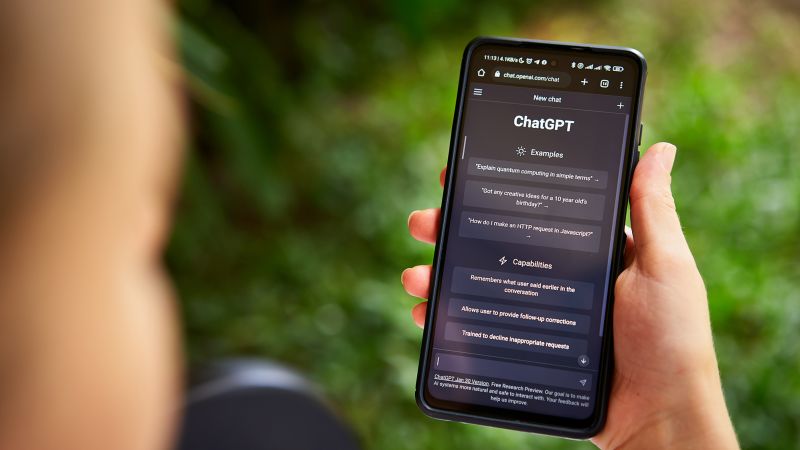New York
CNN
—
Because the tech sector races to develop and deploy a crop of highly effective new AI chatbots, their widespread adoption has ignited a brand new set of knowledge privateness issues amongst some corporations, regulators and business watchers.
Some corporations, together with JPMorgan Chase
(JPM), have clamped down on workers’ use of ChatGPT, the viral AI chatbot that first kicked off Large Tech’s AI arms race, because of compliance issues associated to workers’ use of third-party software program.
It solely added to mounting privateness worries when OpenAI, the corporate behind ChatGPT, disclosed it needed to take the device offline quickly on March 20 to repair a bug that allowed some customers to see the topic traces from different customers’ chat historical past.
The identical bug, now mounted, additionally made it doable “for some customers to see one other energetic person’s first and final title, e-mail tackle, fee tackle, the final 4 digits (solely) of a bank card quantity, and bank card expiration date,” OpenAI stated in a blog post.
And simply final week, regulators in Italy issued a short lived ban on ChatGPT within the nation, citing privateness issues after OpenAI disclosed the breach.
“The privateness issues with one thing like ChatGPT can’t be overstated,” Mark McCreary, the co-chair of the privateness and knowledge safety observe at regulation agency Fox Rothschild LLP, informed CNN. “It’s like a black field.”
With ChatGPT, which launched to the general public in late November, customers can generate essays, tales and track lyrics just by typing up prompts.
Google and Microsoft have since rolled out AI instruments as effectively, which work the identical means and are powered by massive language fashions which are educated on huge troves of on-line knowledge.
When customers enter data into these instruments, McCreary stated, “You don’t know the way it’s then going for use.” That raises significantly excessive issues for corporations. As increasingly workers casually undertake these instruments to assist with work emails or assembly notes, McCreary stated, “I believe the chance for firm commerce secrets and techniques to get dropped into these completely different varied AI’s is simply going to extend.”
Steve Mills, the chief AI ethics officer at Boston Consulting Group, equally informed CNN that the largest privateness concern that almost all corporations have round these instruments is the “inadvertent disclosure of delicate data.”
“You’ve obtained all these workers doing issues which might appear very innocuous, like, ‘Oh, I can use this to summarize notes from a gathering,’” Mills stated. “However in pasting the notes from the assembly into the immediate, you’re all of the sudden, doubtlessly, disclosing a complete bunch of delicate data.”
If the information folks enter is getting used to additional practice these AI instruments, as lots of the corporations behind the instruments have acknowledged, then you might have “misplaced management of that knowledge, and someone else has it,” Mills added.
OpenAI, the Microsoft-backed firm behind ChatGPT, says in its privacy policy that it collects all types of non-public data from the folks that use its companies. It says it might use this data to enhance or analyze its companies, to conduct analysis, to speak with customers, and to develop new packages and companies, amongst different issues.
The privateness coverage states it might present private data to 3rd events with out additional discover to the person, except required by regulation. If the greater than 2,000-word privateness coverage appears a bit opaque, that’s doubtless as a result of this has just about change into the business norm within the web age. OpenAI additionally has a separate Terms of Use doc, which places many of the onus on the person to take acceptable measures when partaking with its instruments.
OpenAI additionally printed a brand new weblog submit Wednesday outlining its strategy to AI security. “We don’t use knowledge for promoting our companies, promoting, or constructing profiles of individuals — we use knowledge to make our fashions extra useful for folks,” the blogpost states. “ChatGPT, for example, improves by additional coaching on the conversations folks have with it.”
Google’s privacy policy, which incorporates its Bard device, is equally long-winded, and it has additional terms of service for its generative AI customers. The corporate states that to assist enhance Bard whereas defending customers’ privateness, “we choose a subset of conversations and use automated instruments to assist take away personally identifiable data.”
“These pattern conversations are reviewable by educated reviewers and saved for as much as 3 years, individually out of your Google Account,” the corporate states in a separate FAQ for Bard. The corporate additionally warns: “Don’t embrace data that can be utilized to determine you or others in your Bard conversations.” The FAQ additionally states that Bard conversations are usually not getting used for promoting functions, and “we are going to clearly talk any modifications to this strategy sooner or later.”
Google additionally informed CNN that customers can “simply select to make use of Bard with out saving their conversations to their Google Account.” Bard customers may overview their prompts or delete Bard conversations through this link. “We even have guardrails in place designed to stop Bard from together with personally identifiable data in its responses,” Google stated.
“We’re nonetheless kind of studying precisely how all this works,” Mills informed CNN. “You simply don’t totally understand how data you place in, whether it is used to retrain these fashions, the way it manifests as outputs sooner or later, or if it does.”
Mills added that generally customers and builders don’t even understand the privateness dangers that lurk with new applied sciences till it’s too late. An instance he cited was early autocomplete options, a few of which ended up having some unintended penalties like finishing a social safety quantity {that a} person started typing in — usually to the alarm and shock of the person.
Finally, Mills stated, “My view of it proper now, is you shouldn’t put something into these instruments you don’t wish to assume goes to be shared with others.”

